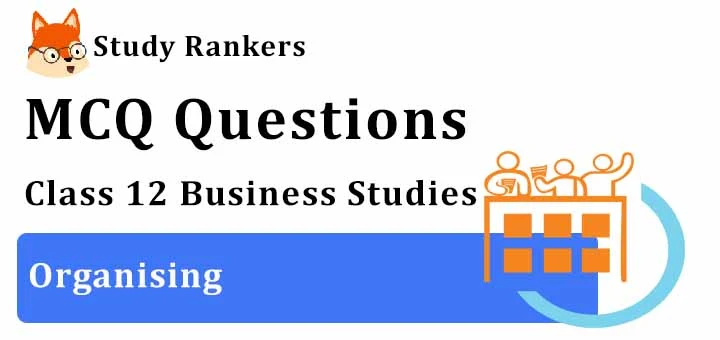MCQ Questions for Class 12 Business Studies: Ch 5 Organising

1. Centralisation refers to
(a) Opening new centers or branches
(b) Retention of decision making authority
(c) Dispersal of decision making authority
(d) Creating divisions as profit centers
► (b) Retention of decision making authority
2. The possibilities of inadequate profits or even losses due to uncertainties are known as ________
(a) Business risks
(b) Business contingencies
(c) Business ventures
(d) None of the above
► (a) Business risks
3. Grouping of activities on the basis of functions is a part of
(a) Decentralised organisation
(b) Centralised organisation
(c) Functional organisation
(d) Divisional organisation
► (c) Functional organisation
4. Properly perform the assigned duty, is ___________
(a) Accountability
(b) Responsibility
(c) Authority
(d) None of the above
► (b) Responsibility
5. _________ is helpful in reducing the burden of the manager
(a) Decentralisation
(b) Centralisation
(c) Delegation
(d) None of the above
► (c) Delegation
6. Meaning of authority is__________________
(a) Subordinate to Superior relationship
(b) Right to avoid taxes
(c) Right to Command
(d) None of the above
► (c) Right to Command
7. Span of management refers to
(a) Number of managers
(b) Number of subordinates under a superior
(c) Length of term for which a manager is appointed
(d) Number of members in top management
► (b) Number of subordinates under a superior
8. What is the first step in organising process?
(a) Establishing reporting relationship
(b) Assignment of duties
(c) Departmentalisation
(d) Identification and division of work
► (d) Identification and division of work
9. Which of the following is not an element of delegation?
(a) Authority
(b) Responsibility
(c) Accountability
(d) Informal organization
► (d) Informal organization
10. A tall structure has a
(a) Narrow span of management
(b) Wide span of management
(c) No span of management
(d) Less levels of management
► (a) Narrow span of management
11. For delegation to be effective it is essential that responsibility be accompanied with necessary
(a) Manpower
(b) Incentives
(c) Promotions
(d) Authority
► (d) Authority
12. Right of an individual to command his subordinates is ______________
(a) Accountability
(b) Authority
(c) Responsibility
(d) None of the above
► (b) Authority
13. Authority delegated to a subordinate can be taken back under __________
(a) Centralisation
(b) Delegation
(c) Decentralisation
(d) None of the above
► (b) Delegation
14. Grouping of activities on the basis of product lines is a part of
(a) Delegated organisation
(b) Functional organisation
(c) Autonomous organization
(d) Divisional organisation
► (d) Divisional organisation
15. What is the last step in organising process?
(a) Identification and division of work
(b) Departmentalisation
(c) Assignment of duties
(d) Establishing reporting relationship
► (d) Establishing reporting relationship
16. The form of organisation known for giving rise to rumors is called
(a) Centralised organisation
(b) Formal organization
(c) Decentralised organisation
(d) Informal organisation
► (d) Informal organisation
17. Organisation establishes relationship between
(a) People, work and resources
(b) Customer, work and resources
(c) People, work and management
(d) Customer, work and management
► (a) People, work and resources
18. ________ cannot be entirely delegated
(a) Responsibility
(b) Accountability
(c) Authority
(d) None of the above
► (a) Responsibility
19. Which of the following is arises from delegation of authority?
(a) Authority
(b) Responsibility
(c) Accountability
(d) None of the above
► (b) Responsibility
20. Nature of informal organisation is _______.
(a) Mandatory
(b) Rigid
(c) Flexible
(d) None of the above
► (c) Flexible
21. Under Accountability a person is answerable for the ___________
(a) Final outcome of the assigned task
(b) Delegation of Authority
(c) Growth of company
(d) None of the above
► (a) Final outcome of the assigned task
22. _______ is helpful in increasing the role of the subordinates in the organisation
(a) Delegation
(b) Decentralisation
(c) Centralisation
(d) None of the above
► (b) Decentralisation
23. Authority, Responsibility and Accountability are the elements of ______________
(a) Decentralisation
(b) Informal Organisation
(c) Delegation
(d) None of the above
► (c) Delegation
24. Product Specialisation is concerned with_____________
(a) Functional Structure
(b) Divisional Structure
(c) Normal Structure
(d) None of the above
► (b) Divisional Structure
25. A network of social relationship that arises spontaneously due to interaction at work is called:
(a) Informal organisation
(b) Formal organisation
(c) Delegation
(d) Decentralisation
► (a) Informal organisation

